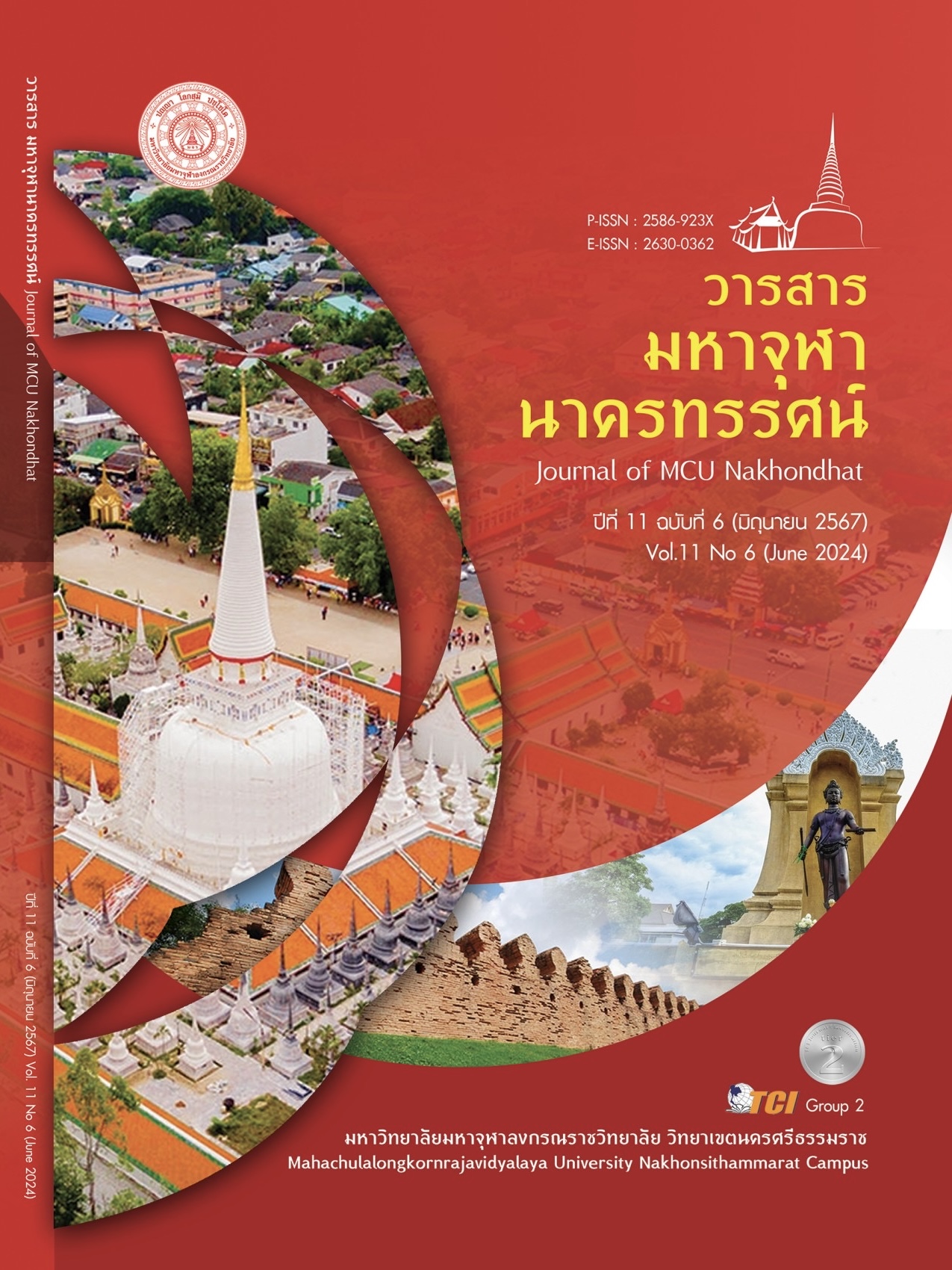EFFECTIVENESS OF THE HEALTH BELIEF MODEL PROGRAM ON COVID-19 PREVENTION BEHAVIOR AMONG SHAN FEMALE MIGRANT WORKERS CHIANGMAI
Main Article Content
Abstract
This research article aims to Study the effectiveness of the health belief promotion program on COVID-19 disease prevention behavior. Among Shan female migrant workers This was quasi-experimental research with two groups measuring before and after. Compare the mean differences in health beliefs. and average behavior for preventing COVID-19 disease Between the experimental group and the control group and compared in the experimental group Before and after receiving the program sample group It was an experimental group of 45 people and a control group of 45 people of Shan female migrant workers. The experimental group will receive a program to promote health beliefs towards COVID-19 prevention behaviors for a period of 6 weeks. Research statistics and data analysis. Compare the means before and after the trial using Paired t-test. Compare the means between groups using independent t-test. The results found that the effectiveness of the health belief promotion program on COVID-19 disease prevention behavior. When comparing the experimental group and the control group after receiving the program. The experimental group had a mean behavior score of 2.78, the control group had a mean behavior score of 1.52, which increased on average by 1.53, and the mean value of health beliefs increased by 0.54, which was statistically significant at the 0.05 level and the results were compared in the experimental group. Before and after receiving the program, the experimental group had a mean behavior score after receiving the program of 3.32, higher than before receiving the program. The mean behavior score was 2.78, which increased on average by 0.57, and the mean value of health beliefs increased by 2.11, with statistical significance at the 0.05 level. It is seen that the program promotes health beliefs towards COVID-19 disease prevention behaviors. Effective in changing behavior to prevent COVID-19 disease.
Article Details

This work is licensed under a Creative Commons Attribution-NonCommercial-NoDerivatives 4.0 International License.
References
กนกวรรณ มีพรหม และปวีณา หมู่อุบล. (2563). เสียงสะท้อนของหญิงแรงงานข้ามชาติในไทยจากสถานการณ์โควิด-19. เรียกใช้เมื่อ 7 กรกฎาคม 2566 จาก https://www.tcijthai.com/news/2020/7/article/10693
กรมกิจการเด็กและเยาวชน กระทรวงการพัฒนาสังคมและความมั่นคงของมนุษย์. (2563). รายงานการพัฒนาเด็กและเยาวชน ประจำปี 2563. เรียกใช้เมื่อ 7 กรกฎาคม 2566 จาก https://www.dcy.go.th/public/mainWeb/file_download/1664788620103-248403179.pdf
กัมปนาท โคตรพันธ์ และนิยม จันทร์นวล. (2565). ความสัมพันธ์ระหว่างความรอบรู้ด้านสุขภาพกับพฤติกรรมการป้องกันการติดเชื้อไวรัสโคโรนา 2019 ของประชาชนในจังหวัดมุกดาหาร. ใน การประชุมวิชาการระดับชาติ มอบวิจัยครั้งที่ 16 วันที่ 11-12 กรกฎาคม 2565 (หน้า 148-160). อุบลราชธานี: มหาวิทยาลัยอุบลราชธานี.
จิตรา มูลทิ. (2564). ปัจจัยที่มีอิทธิพลต่อพฤติกรรมการป้องกันโรคติดเชื้อไวรัสโคโรนา 2019 ของอาสาสมัครสาธารณสุข ประจำหมู่บ้าน อำเภอกงไกรสาศ จังหวัดสุโขทัย. วารสารวิชาการสำนักงานป้องกันควบคุมโรคที่ 9 จังหวัดนครราชสีมา, 27(2), 5-14.
ทรงชัย ทองปาน. (2563). องค์ความรู้ว่าด้วยแรงงานข้ามชาติกับสุขภาพ: ผลจากการสังเคราะห์งานวิจัยว่าด้วยแรงงานข้ามชาติในประเทศไทย. วารสารสุขศึกษา, 43(2), 1-16.
นฤมล วงศ์วัยรักษ์ และรชานนท์ ง่วนใจรัก. (2562). ผลของโปรแกรมการพัฒนาสมรรถนะในการป้องกันและควบคุมโรคติดเชื้อไวรัสซิกาของอาสาสมัครสาธารณสุขศูนย์แพทย์ชุมชนเมือง อำเภอเมือง จังหวัดนครราชสีมา พ.ศ. 2560. วารสาร สำนักงานป้องกันควบคุมโรคที่ 9 จังหวัดนครราชสีมา, 25(3), 24-33.
นิชาภา เหมือนภาค และคณะ. (2565). แบบแผนความเชื่อด้านสุขภาพ ผลกระทบสุขภาพและพฤติกรรมการป้องกันโรคโควิด-19 ของประชาชนจังหวัดนครราชสีมา. วารสารการพยาบาลและการดูแลสุขภาพ, 40(2), 85-94.
พนัชญา ขันติจิตร, และคณะ. (2564). แบบแผนความเชื่อด้านสุขภาพในการป้องกันโรคติดเชื้อไวรัสโคโรนา 2019 (COVID-19) ของประชาชน ในจังหวัดอุบลราชธานี. วารสารวิทยาศาสตร์สุขภาพ วิทยาลัยพยาบาลบรมราชชนนี สรรพสิทธิประสงค์, 5(2), 39-53.
อภิวดี อินทเจริญ และคณะ. (2564). ปัจจัยที่มีอิทธิพลต่อพฤติกรรมการป้องกันโรคติดเชื้อโวรัสโคโรนา 2019 ของประชาชนในเขตเทศบาลเมืองคอหงส์ จังหวัดสงขลา. วารสารสภาการสาธารณสุขชุมชน, 3(2), 19-30.
Becker, M. H. (1974). The Health Belief Model and Preventive Health Behavior. Health Education Monographs, 2(4), 354-385.
Cronbach, L. J. (1990). Essentials of psychological testing. (3rd ed.). New York: Harper&Collins.
Mirzaei, A. et al. (2021). Application of health belief model to predict COVID-19-preventive behaviors among a sample of Iranian adult population. Journal of Education and Health Promotion, 10(1), 1-7.
Rosenstock, IM. et al. (1988). Social learning theory and the Health Belief Model. Health Educ Q, 15(2), 175-183.
Seangpraw, K. et. al. (2022). Using the Health Belief Model to Predict Vaccination Intention Among COVID-19 Unvaccinated People in Thai Communities. Front Med (Lausanne), 2022(9), 1-9.
Syed, M. H. et al. (2021). Application of the health Belief Model to assess community preventive practices against COVID-19 in Saudi Arabia. Saudi Pharmaceutical Journal, 29(11), 1329-1335.
United Nations. (2020). Policy Briefs: The Impact of COVID-19 on Children. Retrieved July 7, 2023, from https://www.un-ilibrary.org/content/papers/27082245/3
United Nations Thematic Working Group on Migration in Thailand. (2019). Thailand Migration Report 2019. Bangkok: Ainergy Studio Company Limited.
Zewdie, A. et al. (2022). The health belief model’s ability to predict COVID-19 preventive behavior: A systematic review. SAGE Open Medicine, 10, 1-10.


